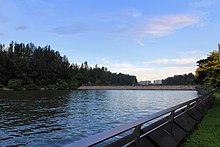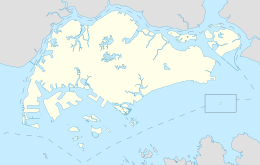Coney Island, Singapore
Native name: Pulau Serangoon | |
|---|---|
| Geography | |
| Location | Southeast Asia |
| Coordinates | 1°24′34.1″N 103°55′18″E / 1.409472°N 103.92167°E |
| Archipelago | Malay Archipelago |
| Area | 1.33 km2 (0.51 sq mi) |
| Administration | |
| Region | North-East Region |
| Planning Area | Punggol
|
| CDC | |
| Town council |
|
| Constituency | |
| Member of Parliament | |
| Demographics | |
| Population | 0 (2015)[1] |
| Additional information | |
| Official website | Coney Island on NParks |

Coney Island, alternatively known as Pulau Serangoon, is a 133-hectare island located off the northeastern coast of Singapore within the town of Punggol, between Pulau Ubin to its northeast and the mainland to its southwest.[2][3]
Land reclamation works were carried out on the island from 1975 to the 1990s, as there were plans to build residential buildings on the southern part of the island. The works narrowed the channel between Punggol and the island to 100m.[4] Still, in spite of this small distance, motor launches had to be specially hired to reach the island until the opening of Coney Island Park, linked to the main island by two bridges on its western and eastern ends.
History
[edit]Formerly known as Pulau Serangoon (English: Serangoon Island), the island was once owned by entrepreneur siblings Aw Boon Haw and Aw Boon Par, before being sold to an Indian businessman, Ghulam Mahmood, in 1950 with the intention of turning the island into a resort modelled after the amusement area at Coney Island, New York.[5]
The land reclamation works begun in 1975, increasing the area of the island from 32 hectares (0.32 km2) to 62 hectares (0.62 km2).[6] Further land reclamation works were carried out during the 1990s with plans to build a 50-hectare park together with the development of Punggol New Town.[4]
The Urban Redevelopment Authority (URA) said that under the Master Plan, a part of Coney Island was zoned for residential, sport and recreational use but as the land is not immediately required for development, a part of Coney Island would be kept as an interim park for the time being. The rest of the island was zoned for park use.[7] On 10 October 2015, Coney Island Park opened to the public, with a beach stretching 2 km (1 mi) and a 2.4 km (1.5 mi) long path that is part of the park connector network. The offshore island of Pulau Serangoon (Coney Island), was formerly part of the Changi SMC from 1951 to 1997, then subsumed into East Coast GRC (Siglap division) from 1997 to 2015 before transferring to Pasir Ris-Punggol GRC after the growth of Punggol.
Activities and facilities
[edit]Coney Island is also a popular place for jet skiing and camping.[8] However, this has contributed to the beaches being polluted by litter such as discarded cans, instant noodle packets and bottles.[9]
Coney Island Park
[edit]Managed by the National Parks Board, the 81 hectares (0.81 km2)[10] nature park is home to a wide variety of habitats, including coastal forests, grasslands and mangroves. The park was officially opened by the Transport Minister and Co-ordinating Minister for Infrastructure, Khaw Boon Wan on 10 October 2015.[11] During its first year of operation, a free-ranging Brahman cow was frequently sighted in the area.[12][13]
Scouting
[edit]The island was proposed as the main venue to host the 23rd World Scout Jamboree, as part of a defeated bid by the Singapore Scout Association.[14]
References
[edit]- ^ "Punggol (Planning Area, Singapore) - Population Statistics and Location in Maps and Charts". City Population (with data from the Singapore Department of Statistics). Retrieved 15 August 2016.
- ^ City Population - statistics, maps and charts | Coney Island
- ^ "[[Ministry of Trade and Industry (Singapore)#Departments & Statutory boards|Singapore Department of Statistics]] - Planning Areas/Subzones in Singapore (Year 2015)" (PDF). Archived from the original (PDF) on 5 March 2016. Retrieved 11 March 2016.
- ^ a b Singapore. Parliament. Parliamentary debates: Official report. (28 July 1997). Estimates of expenditure for the financial year 1 April 1997 to 31 March 1998 (Vol. 67). Singapore: [s.n.], col. 1123. (Call no.: RSING 328.5957 SIN); Tan, H. Y. (31 January 2007). Retrieved 15 August 2016.
- ^ "Ten Things You Need to Know Before Visiting Coney Island Park - Little Day Out". 13 October 2015.
- ^ $14.5m holiday resort plan for Coney Island. (11 March 1974). The Straits Times, p. 4. (Retrieved from NewspaperSG). Retrieved 15 August 2016.
- ^ "Coney Island to open to public in 2015". Lip Kok Wai. TODAY. 2014. Retrieved 3 February 2014.
- ^ "Islands around Singapore". Thinkquest. 2004. Archived from the original on 12 January 2007. Retrieved 28 November 2006.
- ^ "Beaches or the dumps?". The Straits Times. 1991. Retrieved 28 November 2006.
- ^ "Coney Island Park". National Parks Board. Retrieved 8 February 2021.
- ^ "New nature park opens on Coney Island". Channel News Asia. 15 October 2015. Archived from the original on 6 January 2017. Retrieved 15 August 2016.
- ^ "Coney Island: The life and death of a lonely Singapore cow". BBC News. 16 October 2016. Retrieved 16 October 2016.
- ^ "Coney Island cow dies". Channel NewsAsia. Archived from the original on 6 January 2017. Retrieved 16 October 2016.
- ^ Singapore bids for World Scout Jamboree 2015. Coney Island, Singapore: The Singapore Scout Association. 11 July 2008. Retrieved 19 July 2015 – via YouTube.
Notes
[edit]- Victor R Savage, Brenda S A Yeoh (2004), Toponymics - A Study of Singapore Street Names, Eastern Universities Press, ISBN 981-210-364-3




